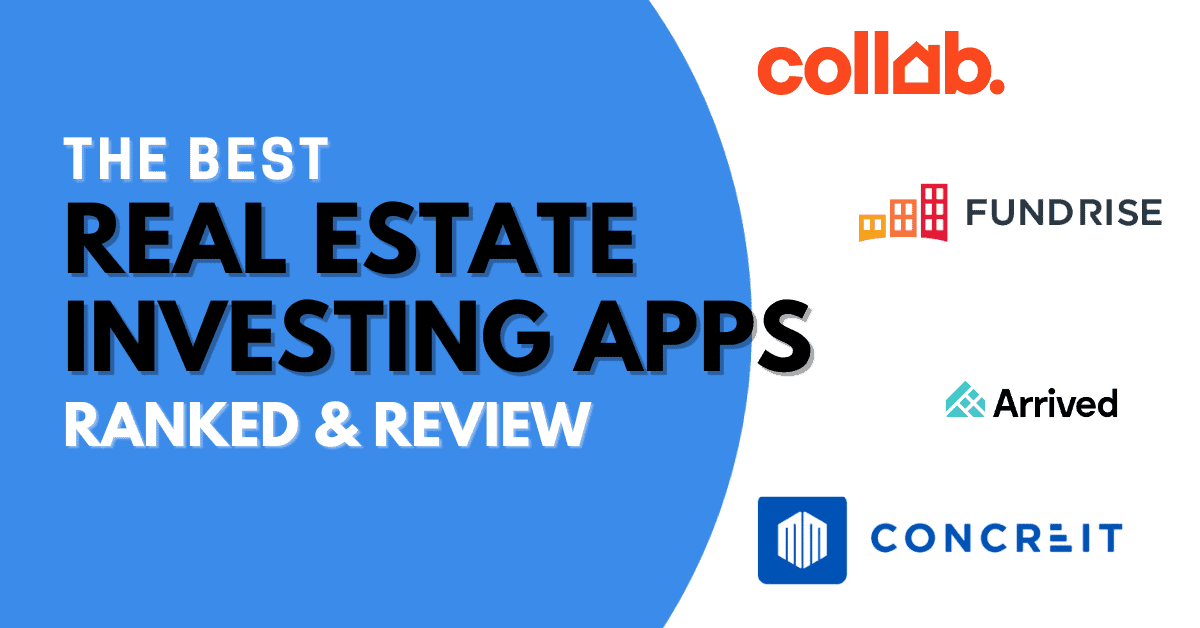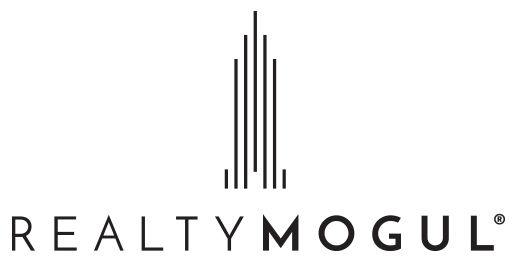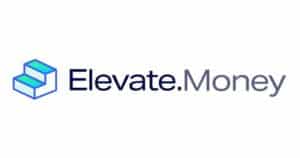7 Best Real Estate Investing Apps (Top Picks for 2024)

Want a convenient, cost-effective way to invest in real estate? There’s an app for that!
And—lucky for you—we’ve done the hard work of sifting through them all to compile our list of the best real estate investing apps below.

Fundrise
Best Overall

Concreit
Best For Beginners

Arrived
Best For Residential

RealtyMogul
Best For Commercial

Collab
Best For Student Housing

AcreTrader
Best For Land

GroundFloor
Best For Note Investing
Today, anyone with a smartphone and a few dollars can purchase shares in multi-billion dollar commercial and residential real estate portfolios. And if you’ve got the funds, some real estate apps allow you to buy whole properties with a few thumb swipes.
But which app suits you? Which platform fits your level of risk-taking?
This article will look “under the hood” at the best real estate investing apps. We’ll compare each app’s features, pricing, benefits, and limitations. And then, we’ll make recommendations based on who we think each app is best suited for.
The Best Real Estate Investing Apps: Deep-Dive
1. Fundrise (Best Overall)
Fundrise is a crowdfunding real estate app that lets users invest in pools of real estate assets—these are typically income-generating properties the company manages or mortgages.
These pools—called eREITs—are similar to REITs (Real Estate Investment Trusts) but exclusive to Fundrise and not traded publicly, meaning they aren’t tied to the stock market. They also offer eFunds, a different pool for developing and selling single-family homes.
Both eREITs and eFunds are proprietary to Fundrise—you won’t find them outside the platform.
Pros
- Low minimum investment (just $10 for the Starter account)
- Low fees
- Exposure to different types of funds and eREITs
- User-friendly on both desktop and mobile
Cons
- Long-term commitment
- Limited customer service options
2. Concreit (Best for Beginners)
Concreit is a real estate investment app ideally suited for new or non-accredited investors who want to build cash flow quickly. Here’s why:
- The minimum investment required to invest with Concreit is super low (like single-digits low).
- And users get paid weekly, not once every quarter, which is especially exciting for those who like to watch our money grow in real time.
Concreit is unique, too, in that they expose investors to both sides of the investment coin—they’ve built a portfolio of both equity and debt investments.
Pros
- Minimum investment of just $1 (yeah, seriously)
- Weekly payouts
- Historically high-yield/low-risk investment strategy
- Simple fee structure
- In-depth investment analysis
- Automated dividend reinvestment
Cons
- Long-term commitment
- Limited customer service options
Real estate debt investments are popular because they tend to offer more reliable returns and are a “safer” part of the capital stack.
Alternatively, equity investments have no cap on returns, and your initial investment can become more valuable through appreciation. It’s more risky but potentially more lucrative.
3. Arrived Homes
Arrived Homes is a crowdfunding real estate investing platform with a simple offer that can be broken down into four simple steps.
- Set up an account with Arrived Homes
- Select a rental property you like in the app (they give you the property details upfront)
- Use the built-in investment calculator to loosely predict your expected return
- Invest your money and wait for your projected return to hit your account
That’s it—four steps, and you’re a bona fide investor with an ownership interest in rental property. Arrived Homes makes real estate investment so friggin’ simple.
If you’ve ever done any joint-venture deals, you know how difficult it can be to get four or five like-minded investors to come together on a deal. This app lets you go in on deals with hundreds of other investors without hassle, haggling, or meetings!
Pros
- Low minimum investment
- Very easy to learn & use
- Quarterly dividend payouts
- Cash-out equity if the property gets sold
- FUN
Cons
- A limited selection of properties
- Several fees
4. RealtyMogul
RealtyMogul is a window into the bustling world of commercial real estate properties.
Whether it’s an office tower, shopping center, or parking lot, this app connects you to opportunities many investors never think to aim for (or otherwise think are out of reach).
And if it’s your first time delving into commercial real estate, don’t worry—RealtyMogul has a treasure trove of educational content in the form of blog articles, webinars, and tools.
The cherry on top? RealtyMogul gives frequent updates on your investments and maintains a high level of transparency. If you want information, they’ll provide it.
Pros
- Various commercial real estate investments (skyscrapers to skating rinks)
- Transparency. They offer a lot of information to users
- Great educational resources – articles, webinars, tutorials, etc.
- Well-designed and user-friendly app
- Self-directed IRA options
Cons
- Medium to Long-term investments, so liquidity is a concern
- Minimum investment is slightly higher than competitors (could be a turn-off for some)
- Information can be overwhelming sometimes
5. Collab
Collab is a real estate crowdfunding platform focusing on the student housing sector. And that means they can offer everyday investors tailored insights, data, and support for a niche that can be difficult for retail investors to break into.
But what’s unique about Collab is how they encourage/incentivize investors and tenants to help manage the property portfolio. I provide a more in-depth breakdown of this investor/operator concept. See my take below for details.
Overall, Collab is your best bet if you’re looking for an easy way to find, analyze, and participate in real estate investment opportunities for student housing.
Pros
- Access to the student housing sector (high demand/low competition niche)
- Top-level property analysis
- Monthly dividend payouts
- Reg A+ with the SEC gives access to a wider pool of investors
- Multiple ways to make $$$ (passive and earned income)
Cons
- No secondary market to buy or sell shares
- No diversification
6. AcreTrader
AcreTrader breaks away from the somewhat stale investment property landscape, focusing instead on an overlooked gem: farmland.
Each farm is vetted heavily by the AcreTrader team, and only a few make the cut; this scrutiny ensures users only invest in land with potential for yield and appreciation.
Returns come from annual rent payments from lessees (usually farmers) in the form of dividends and appreciation as the value of the land goes up.
AcreTrader manages everything from tenant relationships to insurance and property taxes and ensures the land is used sustainably.*
I learned from conducting this review that sustainability for farmland isn’t a marketing gimmick. Using land sustainably is good for the earth, and it’s good for profitability, too.
Pros
- Access to raw land investments without needing to manage them, bridging the gap between urban investors and rural assets.
- Diversification. Acretrader offers a wide range of farmland spread across different regions, growing various crops.
- Clear fee structures and regular property updates.
- The customer support team is top-notch, and the company has few (if any) negative reviews online. Rare.
Cons
- Accredited investors only 🙁
- A limited number of deals to invest in
7. GroundFloor
Groundfloor specializes in lending for real estate, allowing investors to fund short-term, high-yield loans secured by residential properties.
The process is simple: investors pick through a list of property loans, each with a detailed breakdown of the potential risks and returns. Investors can then choose exactly where their dollars go, whether it’s flipping houses in Atlanta or refurbishing condos in Charlotte.
The short-term nature of these loans aims to offer a quicker ROI than traditional real estate investments. Returns are generated as borrowers repay the loan.
Groundfloor is appealing for real estate investors wary of the rollercoaster nature of the stock market or the long-term real estate market.
Pros
- You can invest in deals with as little as $10
- Better liquidity with short-term loan investments
- Exposure to various real estate projects (fix n’ flips, rehabs, new construction, etc.)
- No management fees
Cons
- Reports of high default rates on loans 🙁
- Few monthly dividend opportunities
Honorable Mention: Elevate Money

Elevate Money is a true crowdfunding platform, not a fintech company or established lender that decided to get into the crowdfunding space.
So, if you want an easy entry point into the commercial investment space and like that “startup energy” feel, check them out.
Sidenote: Elevate Money is also teaming up with Boxabl to tackle the ongoing affordable housing crisis in the US. As of 11/3/2023, you can even become a part-owner of Elevate Money as they raise capital from investors for this next brave step.
What Are Real Estate Investing Apps?
Real estate investing apps allow users to invest their money in real estate, whether by purchasing fractional shares in a property or shares in a REIT (real estate investment trust).
A few real estate apps go so far as to let users purchase whole properties—slab to shingles—with a few thumb swipes.
How We Rank Real Estate Investing Apps
The criteria we use are a mix of what we look for in an investment platform (or any software, for that matter) AND what users most complained about with apps they DIDN’T like.
Here are the five major things we looked for:
- The app must deal mainly with real estate. And while apps like Fundrise do offer “alternative investments,” the vast majority of the apps on this list deal primarily in real estate assets.
- The app (or parent company) must have a stellar reputation. This is based on customer review sites (Google, Trustpilot, etc.) and public forums (BiggerPockets, Reddit, Quora).
- Ease-of-use. If we can’t figure out how to use the app, we won’t recommend it.
- The pricing and/or fee structure needs to be reasonable and with clear terms. No sneaky contract shenanigans or hidden fees.
- Every app must have intuitive QoL (quality-of-life) features, such as mobile compatibility, easy transfers/deposits, clever automation, customer support features, etc.
These items aren’t the only ones we considered, but they establish a solid basis for ranking/reviewing real estate apps.
Frequently Asked Questions About Real Estate Investing Apps
Are real estate investment apps worth it?
Real estate investment apps can be worth it if you’re looking for a convenient entry point into real estate without the need to manage properties or invest a lot of money. Plus, they offer diversified portfolios (think commercial and residential) and are useful for learning about the overall market.
Where can I invest $1,000 in real estate?
With $1,000, you can start investing in real estate through crowdfunding platforms like Fundrise or REITs (Real Estate Investment Trusts). Both options pool money from many investors to buy property or mortgage loans.
How to invest in real estate with little money?
Real estate crowdfunding platforms offer a way to invest smaller amounts in property-backed projects. Another option is wholesaling real estate, which requires very little capital investment to get started.
What is the most profitable real estate to invest in?
Generally, commercial real estate or residential properties in high-demand areas offer the highest returns. However, these can also come with higher risks, so due diligence is crucial.
Final Thoughts
Real estate investing apps are arguably the most passive way to invest in real estate assets.
And like any well-designed financial application, they aim to make investing as easy and affordable as possible. But whether you win or lose is not their concern.
If you’re a seasoned investor, you’re probably used to financial apps and won’t have trouble navigating those listed here. But if you’re new to investing apps (or just investing in general), please educate yourself before investing any of your hard-earned money.
That said, if you want a low-cost way to get into the game, check out Fundrise. It’s a rock-solid option for most investors; it’s easy to learn, easy to use, has low minimums, and has great tech—it’s the app to beat.


